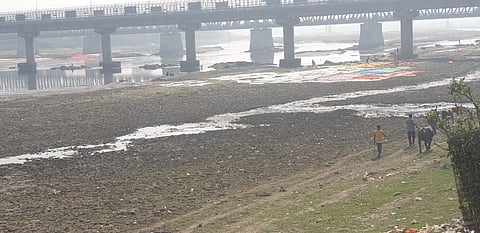Green Activists In Agra Demand Cleaning Up Of Yamuna Before Monsoon
Agra, May 21 (TNA) Green activists in Agra have demanded prompt follow-up of the Supreme Court directive to de-silt and clean up the Yamuna river bed before the monsoon rains start. A Memorandum to the divisional commissioner who is also the chairperson of the eco-sensitive Taj Trapezium Zone, has urged him to Initiate cleaning, cesilting, and dredging of the Yamuna River ahead of monsoon in compliance with the Supreme Court Order.
The River Connect Campaign members demanded intensive cleaning, desilting, and dredging work in the Yamuna River before the onset of the monsoon season. The memorandum underscores the critical need to enhance the river's capacity to mitigate the risks of flooding and ensure the sustainable management of this vital water resource.
“Yamuna River, a lifeline for millions of people in the Braj Mandal has been facing alarming levels of pollution and siltation due to unchecked human activities and industrial effluents. The accumulation of silt and pollutants poses a significant threat to the river's ecosystem and increases the likelihood of flooding during the monsoon season, putting adjacent communities at risk,” the memorandum said.
Desilting of the sludge and effluents was necessary to restore its natural flow and function. By adhering to the Supreme Court order and initiating these essential measures, Commissioner Agra has the opportunity to proactively address environmental degradation and strengthen the resilience of the Yamuna River against the impacts of monsoon rains, environmentalist Devashish Bhattacharya said.
He added that by fostering collaboration and participation, Commissioner Agra can ensure comprehensive and sustainable solutions that benefit both the ecosystem and the people dependent on the river. The initiative to clean, desilt, and dredge the Yamuna River aligns to promote environmental sustainability and preserve India's natural heritage for future generations.
The river bed in the urban segment has become hard and solid due to polythene, plastic, and waste from shoe factories. The water percolation is no longer possible. This has resulted in a falling water table in the city, said Dr Mukul Pandya of the Agra Heritage Group. The shallow pools on the river bed had become breeding grounds for bacteria and mosquitoes. Frequently we find the white marble surface of the Taj Mahal disfigured by colonies of greenish bacteria, Pandya added.
The situation had become alarming as hundreds of big and small drains continuously discharged untreated waste, sullage, and sewer. The activists said “This is the right time to clean up the river bed, using machines and trained manpower. No time should be lost.” The concerned departments have to respond to the directive of the Supreme Court on July 11, on a petition by a senior advocate of the apex court KC Jain.

